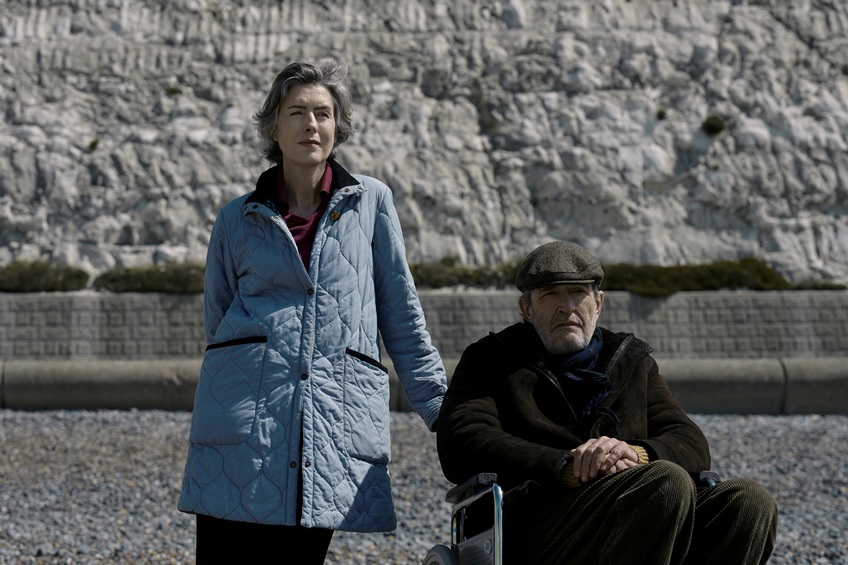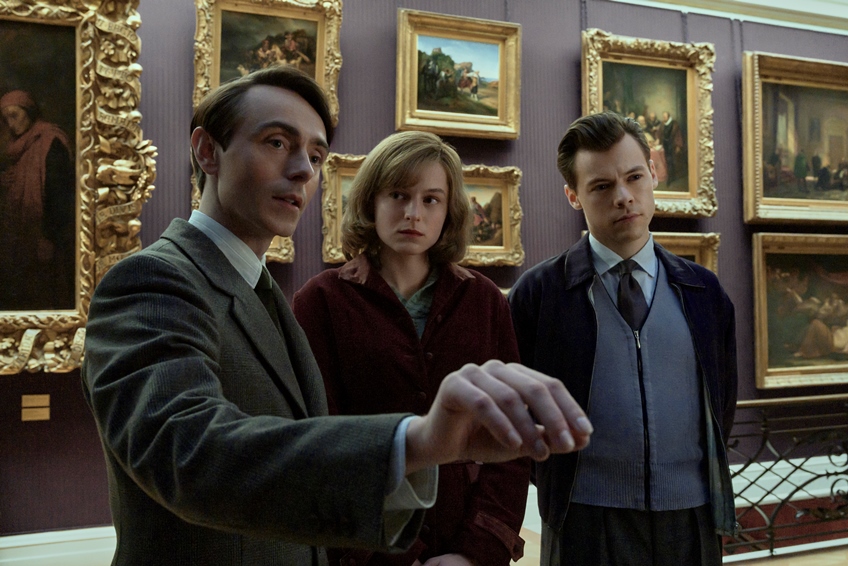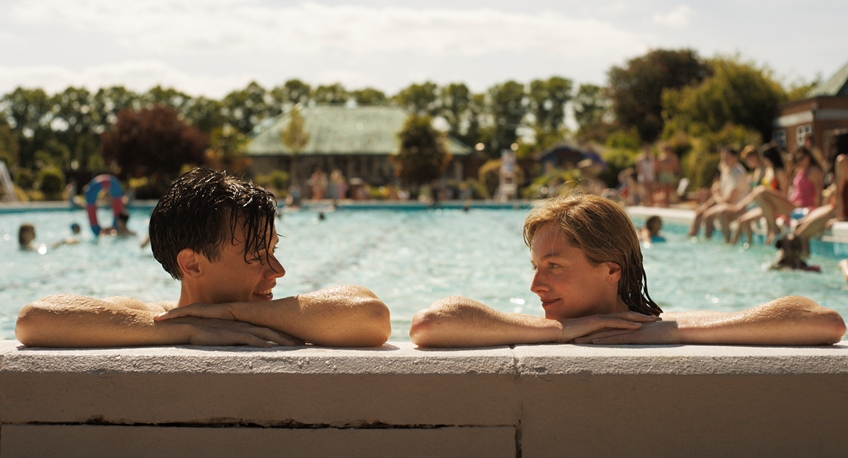Joyce Glasser reviews My Policeman (October 21, 2022) Cert 15, 113 mins.
Having been artistic director of Sheffield Theatres and then London’s Donmar Warehouse, it’s not surprising that when theatre director Michael Grandage turned to directing films, he was attracted to literary lives in his directorial debut Genius. Despite that film’s lukewarm reception, the attraction is so strong when the lives have so much to say about our own or our parents, that Grandage returns with My Policeman. His new film stars musician-heartthrob Harry Styles, in his second film in a repressive 1950’s setting after Don’t Worry Darling, with a meatier role. Quite apart from the qualities of his film as art and entertainment, Grandage might succeed in interesting an unlikely audience in the work of Merchant Ivory muse, E.M. Forster.
You can watch My Policeman without ever knowing that it is based on Bethan Roberts’ book, which is loosely based on novelist EM Forster’s relationship with a much younger, married policeman. Though Grandage and scriptwriter Ron Nyswaner (Philadelphia), succeeds in conveying the stifling, dreary atmosphere of 1950s England and the illicit passions struggling to break free of societal convention, you can’t help wishing that Todd Haynes had had a go at the script.
Marion (Gina McKee), an attractive woman in her late fifties, accepts delivery from a hospital of Patrick Hazelwood, a hirsute, silent stroke victim in a wheelchair (Rupert Everett), along with his personal belongings that, we are told, ‘went to the hospital when he sold the house.’ They should have been under lock and key.

First impressions matter, and sadly the film is saddled with this opening flashback that instils confusion for most of the film (more on that later). We have an establishing shot of a large, comfortable house across the street from the sea in Sussex, but Marion’s relationship with the silent patient, Patrick, is unknown. As his volunteer nurse, it will become awkwardly intimate. We only appreciate just how awkward when we return to the flashback in the third portion of the film.
In an effort to warm the frosty room, Marion shows an unresponsive Patrick a newspaper article announcing Turner Prize shortlisted Tracy Emin’s, My Bed, adding that she would like to see it. ‘It’s you who taught me about art,’ she reminds him. But it’s what he taught her husband that provokes his outcry for her to leave him alone. This exchange dates the present time to 1998, the year that the Bolton Seven controversary paved the way for the Civil Partnership Act six years later.
Marion’s husband, Tom (Linus Roche) wants nothing to do with the unwanted visitor and wants him relegated to the spare room. ‘He’s not a prisoner you know,’ Marion replies. We do not know what Patrick did to Tom that he is so hostile, but we begin to suspect that he doth protest too much.
The mysteries are dispelled in the highly entertaining, best section of the film, when we go back to the 1950s, and the courtship of virginal trainee schoolteacher Marion (Emma Corrin, excellent) and police trainee Tom (Harry Styles). The two, who remember one another from grade school, start a relationship when Tom, a new police recruit, is stationed near Brighton. He asks Marion to recommend some books for him to read in exchange for swimming lessons (an opportunity for Marion and fans to see her future husband’s body). The courtship is sweet, nostalgic, but platonic.
At the same time as Marion is falling for Tom, despite the cultural cap between them, Tom meets Patrick during the course of his police work. Patrick is an artist and curator at the Brighton Museum, older and more sophisticated than Tom who falls for Patrick’s would you like to see my etchings routine. Frightened and reluctant to acknowledge his attraction to Patrick, and mindful of his job in upholding the city’s decency laws, Tom’s initiation is fraught with emotions that Styles, to his credit, does a good job expressing.

Tom introduces Marion to Patrick who conducts tours of the museum for school groups (you wonder why she had known Patrick earlier). When Patrick takes the two to the opera and around the museum, he is throwing culture-loving Marion a bone in order to remain by Tom’s side. Soon, they are a threesome, even, it turns out after Tom and Marion’s wedding night when he shows up to cook a champagne lunch.
We feel sorry for Marion, sexually unfulfilled and full of doubt about her husband’s sexuality but understand why she stays with him after spotting the two men touching in the woodshed the day after their wedding night. Divorce carries its own stigma in the 1950s. But when the two men go off together to Venice (the city she tells both men that she would most like to see) on a bogus work trip, her impetuous bid for vengeance blows up in her face.
While it’s lovely to see Everett and Roache reunited a quarter of a century after The Wings of the Dove the casting is curious. The confusion referred to earlier comes from the fact that younger Patrick is played by David Dawson who looks nothing like his older counterpart (Rupert Everett) but bears an uncanny resemblance to the older Linus Roache (Tom). Since Styles looks nothing like Roache you might go through the whole film making the distracting visual switch in your mind.
Although Marion did not stop working when she married, which was common at the time, you might wonder how a policeman and a schoolteacher (could afford such a beautiful, big house by the sea. Patrick had a house to sell, indicating that he was able to work for a living, although the middle years are not dramatised. What are, in part, dramatised in a slightly lurid way, are Patrick’s explicit diaries that Marion reads, in case she needed to wallow in the past any deeper.
Both Tom and Marion make sacrifices for the sake of a dreary marriage that seems to be the most practical solution to their mess. But when – no doubt aided by the diaries – Marion makes her big decision, you wonder why it took her so long.
With the exception of a savvy fellow schoolteacher (who ironically turns out to be a Lesbian) Marion has no friends or family in whom she can confide and neither does Tom. What do the two talk about? What do they do all day long in the house by the sea? Poor Roache, McKee and Everett have little to do as actors either. The ending, with Marion’s noble gesture and the perfect, satisfactory ending to this melodrama, is a long time coming, but comes too abruptly.




